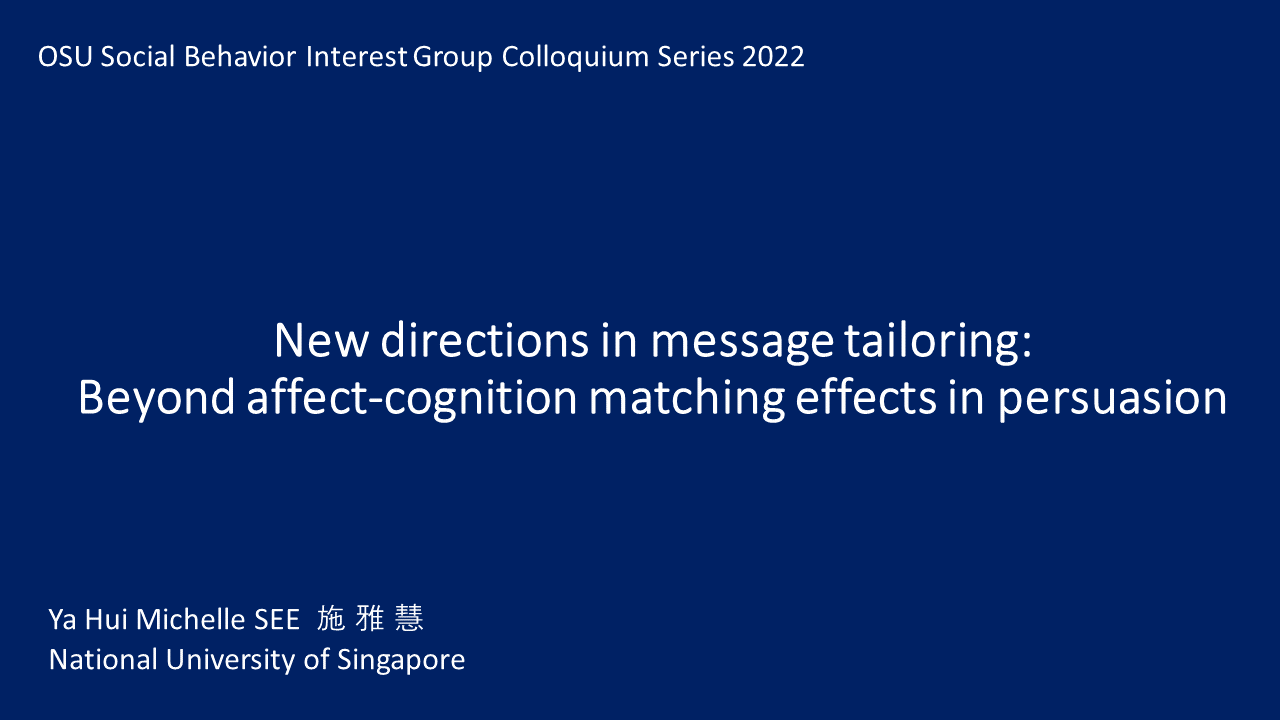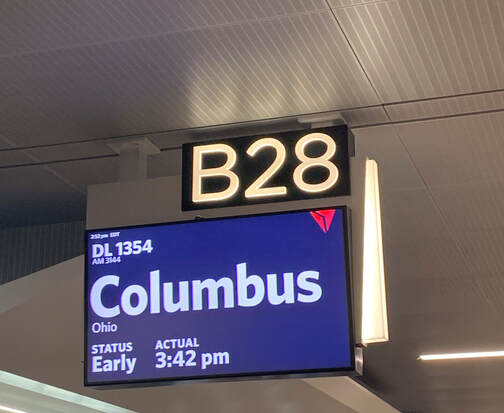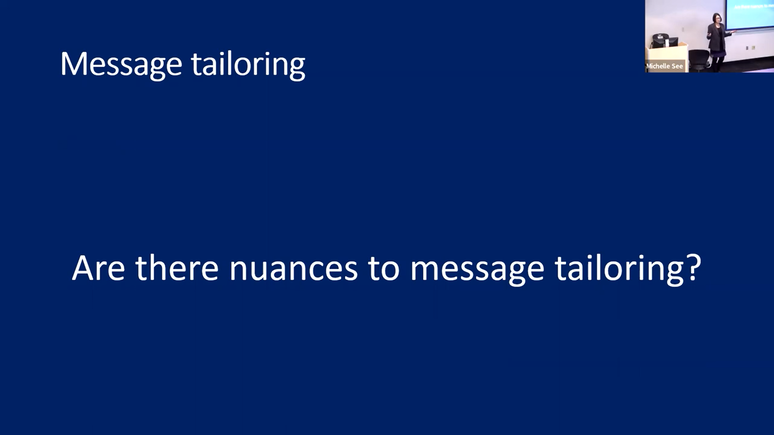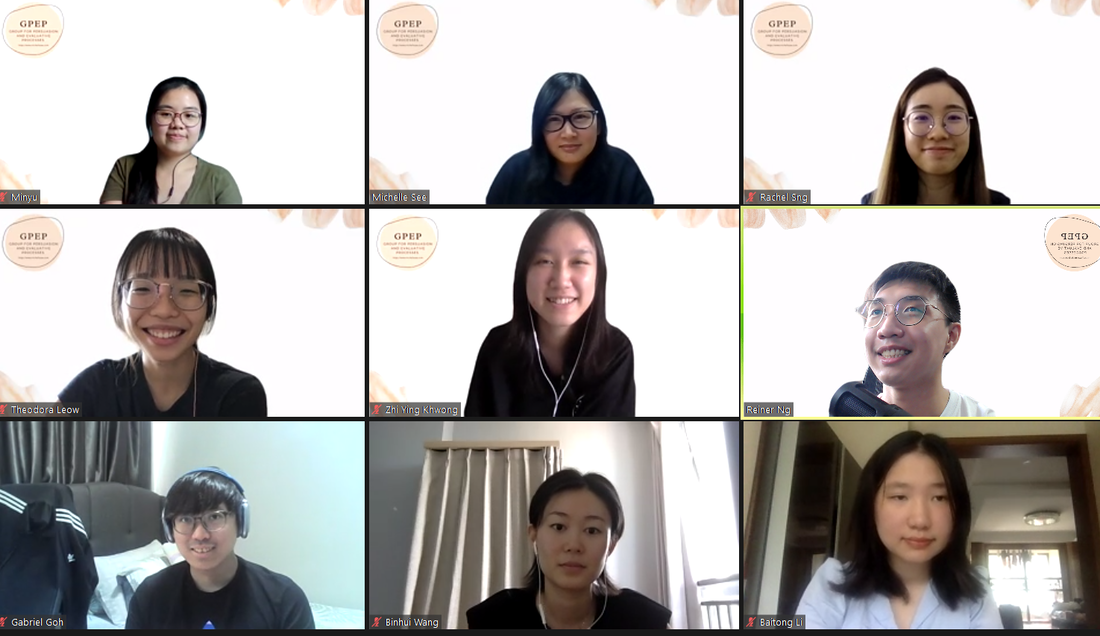|
With constant monitoring and collection of personal data, message tailoring has become even more pervasive. In an invited talk to The Ohio State University Social Behavior Interest Group Colloquium Series, Dr See presented new findings addressing the following questions: When does message tailoring backfire? Does message tailoring impact other outcomes besides attitudes? Do lay individuals use message tailoring to persuade their partners? Taken together, the evidence suggests that there are more nuances to message tailoring than previously thought, with implications for both informed consumers of persuasive attempts and practitioners who seek to deliver tailored interventions. On a personal note, because Dr See spent some of her most formative adult years at OSU, the talk was a meaningful homecoming for her and she was grateful and delighted to share her research at OSU.
0 Comments
Congratulations to Ivy Cheng on her acceptance to the Kent State University Social-Health Psychology PhD program! Ivy will be joining the Social, Health, and Risk Perception lab led by Dr Jennifer Taber. We look forward to further contributions from Ivy as she achieves even more research milestones in the future!
Congratulations to Travis Lim for his acceptance to the PhD program at McGill University! Travis will be joining the Seeing Human Lab led by Professor Eric Hehman. We look forward to further research contributions from Travis as he undertakes this challenging and exciting path!
We are happy to welcome Alessia Valmori to our lab. Alessia is a PhD student who is visiting from University of Padua (Padova), Italy, and she has finally arrived in Singapore after pandemic-related disruptions. We look forward to her participation and hope she has an enjoyable and fruitful time here in Singapore and in our lab!
We are happy to share news about our paper acceptance in the Personality and Social Psychology Bulletin entitled, "Defensive confidence and certainty in unchanged attitudes: The role of affect-cognition matching." This research demonstrates that when presented with an attacking message that is mismatched to the affective-cognitive orientation of the attitudes, low defensive confidence people may resist the attack but become less certain in their unchanged attitudes because they perceive themselves to be less informed. This work suggests that the extant theorizing on attitude certainty can be extended through the lens of affect-cognition matching, and enhances our understanding of consequences of facing counter-attitudinal persuasion.
A pre-print of this paper can be found here: https://www.michellesee.com/uploads/1/1/9/6/119627433/dc_x_aff-cog_matching_pspb_preprint.pdf Congratulations to Gabriel Goh and Travis Lim on their Graduate Students' Teaching Awards! This award recognizes excellence in teaching by graduate students in the Faculty of Arts and Social Sciences. We look forward to their continued involvement in the learning journeys of various undergraduate students in the upcoming semesters!
On the 4th of August 2021, the Group for Persuasion and Evaluative Processes (GPEP) hosted our first virtual symposium, which saw many new and familiar faces. Like many other symposiums, we aimed to create an energizing virtual space for participants to network and connect. We had a series of interesting live talks and Q&A sessions from our graduate students which centered on topics ranging from attitudes, intergroup relations, and cross-cultural differences. Not only that, our members and guests had plenty of opportunities to interact with one another in the many break-out sessions which provided a more comfortable space for light-hearted conversations. Despite being a fully virtual event, the experience was also enjoyable for me compared to a physical event. With this being the first time, I had to present to an online audience, I realized my worries were for naught because the participants were engaged and provided me with many interesting future directions that were worth pursuing. Moreover, having a virtual event allowed colleagues from overseas to join us, even with the travel restrictions in place due to the pandemic. Through this symposium, I felt recharged as I got to interact with other researchers and gained more insights into my field of research.
In reflecting on the symposium, many participants found the event to be valuable. One participant highlighted that the symposium was a much-needed respite from her daily routine. Another mentioned that the causal break-out sessions allowed the opportunity for understanding the future plans that the different researchers had. In light of the current pandemic, this virtual symposium provided a way for us to keep in touch and exchange ideas without having to return to campus. Through this and future symposiums, we hope that participants can forge and expand their networks with other like-minded individuals who are also interested in the research we do at Group for Persuasion and Evaluative Processes. By Reiner NG and Rachel SNG Congratulations to Tan Yang Sheng, Jonathan and Choo Zhan Yi for graduating! The lab is proud of your accomplishments and we wish you the best of luck in all your future endeavors. Congratulations once again, Class of 2021!
We are excited to share news about our forthcoming paper, co-authored with Andy Luttrell in Journal of Experimental Social Psychology on “When dueling emotions and conflicting beliefs predict subjective ambivalence: The role of meta-bases.” Given that subjective ambivalence can have desirable or undesirable outcomes for one’s attitudes and receptivity to persuasion, this work is interesting because it demonstrates that mixed emotions predict subjective ambivalence when there is relatively strong interest in processing affect, but it is mixed beliefs that predict subjective ambivalence when there is relatively strong interest in processing cognition. Thus, this research sheds light on the under-explored distinction between affect and cognition in mixed reactions and meta-bases when predicting subjective ambivalence.
A pre-print of this paper can be found here: https://www.michellesee.com/uploads/1/1/9/6/119627433/iac_n_icc_x_mb_on_sa_pre-print.pdf We are excited to share news about our forthcoming paper, co-authored with Kenneth Tan in Social Cognition on “Tugging at Their Heartstrings: Partner’s Knowledge of Affective Meta-Bases Predicts Use of Emotional Advocacies in Close Relationships.” This work suggests that in the context of romantic relationships, a persuader is more likely to tailor their influence attempts by using emotional appeals when their perception of their partner (the intended message recipient) is validated by their partner’s self-perception.
A pre-print of the paper can be found here: https://www.michellesee.com/uploads/1/1/9/6/119627433/emotional_advocacy_preprint.pdf |
Archives
July 2023
|




 RSS Feed
RSS Feed